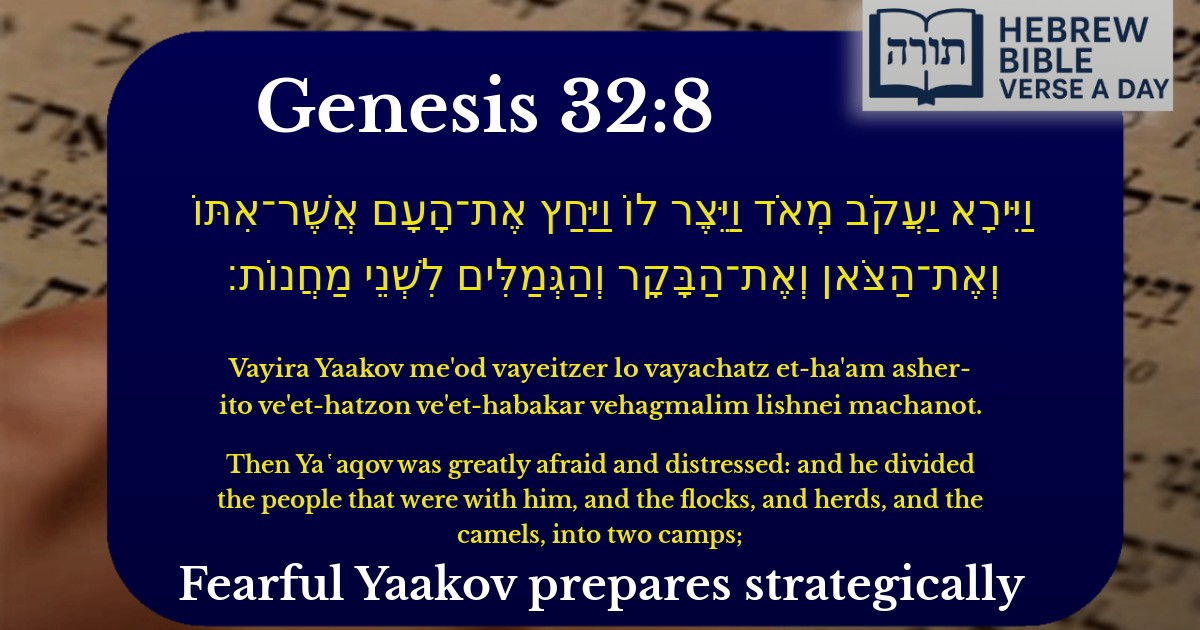Join Our Newsletter To Be Informed When New Videos Are Posted
Join the thousands of fellow Studends who rely on our videos to learn how to read the bible in Hebrew for free!
Hebrew Text
וַיִּירָא יַעֲקֹב מְאֹד וַיֵּצֶר לוֹ וַיַּחַץ אֶת־הָעָם אֲשֶׁר־אִתּוֹ וְאֶת־הַצֹּאן וְאֶת־הַבָּקָר וְהַגְּמַלִּים לִשְׁנֵי מַחֲנוֹת׃
English Translation
Then Ya῾aqov was greatly afraid and distressed: and he divided the people that were with him, and the flocks, and herds, and the camels, into two camps;
Transliteration
Vayira Yaakov me'od vayeitzer lo vayachatz et-ha'am asher-ito ve'et-hatzon ve'et-habakar vehagmalim lishnei machanot.
Hebrew Leining Text
וַיִּירָ֧א יַעֲקֹ֛ב מְאֹ֖ד וַיֵּ֣צֶר ל֑וֹ וַיַּ֜חַץ אֶת־הָעָ֣ם אֲשֶׁר־אִתּ֗וֹ וְאֶת־הַצֹּ֧אן וְאֶת־הַבָּקָ֛ר וְהַגְּמַלִּ֖ים לִשְׁנֵ֥י מַחֲנֽוֹת׃
וַיִּירָ֧א יַעֲקֹ֛ב מְאֹ֖ד וַיֵּ֣צֶר ל֑וֹ וַיַּ֜חַץ אֶת־הָעָ֣ם אֲשֶׁר־אִתּ֗וֹ וְאֶת־הַצֹּ֧אן וְאֶת־הַבָּקָ֛ר וְהַגְּמַלִּ֖ים לִשְׁנֵ֥י מַחֲנֽוֹת׃
🎵 Listen to leining
Parasha Commentary
📚 Talmud Citations
This verse is quoted in the Talmud.
📖 Berakhot 4b
The verse is referenced in the context of discussing Jacob's fear and his strategic division of his camp, illustrating his wisdom and reliance on divine protection.
📖 Megillah 16b
The verse is mentioned in a discussion about the actions of biblical figures under duress, highlighting Jacob's prudence in the face of potential conflict with Esau.


Yaakov's Fear and Strategic Division
The verse describes Yaakov's reaction upon hearing that his brother Eisav is approaching with 400 men. The Torah states, "וַיִּירָא יַעֲקֹב מְאֹד וַיֵּצֶר לוֹ"—"Then Yaakov was greatly afraid and distressed." Rashi (Bereshit 32:8) explains that Yaakov feared two possibilities:
The Division into Two Camps
Yaakov's response to his fear was to divide his camp into two groups ("וַיַּחַץ אֶת־הָעָם... לִשְׁנֵי מַחֲנוֹת"). The Midrash (Bereshit Rabbah 76:3) elaborates on this strategy:
Rambam's Perspective on Fear and Trust in Hashem
Rambam (Hilchot De'ot 2:3) teaches that while one must trust in Hashem, it is also proper to take natural precautions—a principle demonstrated by Yaakov. His fear did not indicate a lack of faith but rather a recognition of human responsibility in the face of danger.
Symbolism of the Two Camps
The Kli Yakar (Bereshit 32:8) suggests a deeper meaning behind the division: